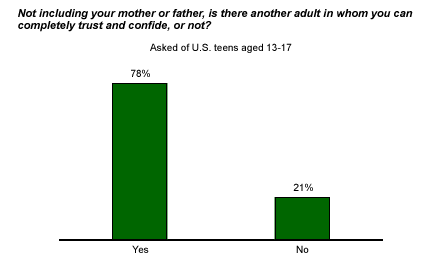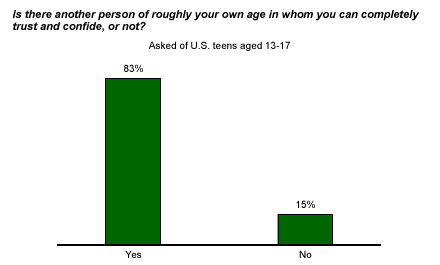With all the tumultuous physical and emotional changes they go through during adolescence, teenagers often find it harder to talk to their parents about what's going on in their lives than they did when they were children. Because teens are growing into self-reliant adults, they often seek other people's opinions as part of their own self-discovery. So, if talking to mom or dad about grades, drug use among friends, or even just who to take to prom is out of the question, who else do teens turn to for advice or simply an ear to listen?
In response to a recent Gallup Youth Survey*, 78% of teens said that there is another adult (not including mom or dad) in whom they can completely trust and confide; 21% said there isn't. Boys and girls, younger and older teens, and teens in different regions of the country all answered this question similarly.

"If a child knows something is missing in their lives, they are drawn to a coach, a teacher, or someone who can give that to them," says Chuck Cooper, the chief executive officer of Big Brothers Big Sisters of the Midlands, which matches kids with volunteer mentors in the Omaha, Neb., area. The high percentage of kids who say they have a close relationship with an adult indicates how important these relationships are to them, Cooper says. "Within that 78%, even if that person is just an uncle and they only talk to him maybe once a month, this child thinks that's important."
Linsey, a 17-year-old from Avoca, Iowa, says she trusts and confides in her basketball coach. "My coach's daughter died in a car accident a couple of years ago, and so we sort of fit together like father and daughter. I can tell him anything and everything and he always understands and can give the greatest advice. He doesn't tell anyone, even my mom (whom he is also very close with), the things I don't want him to."
Elizabeth, a 13-year-old from Lincoln, Neb., says she has a close relationship with one of her mother's friends. "I completely put my trust in her," she says. "We show a lot of common interests and I've known her all my life, almost as long as I've known my mother."
Unlike Linsey and Elizabeth, about one in five teens say they don't have adult confidants other than their parents. Some kids may be seeking to fill a void in their lives, but don't know to where to look; organizations such as Big Brothers Big Sisters seek to step in before negative influences completely fill that void and it's too late. Cooper illustrates it this way: "Close your eyes and imagine a coach, a minister, a priest or someone else who has been important in your life. Now rip them out. Think of how big a hole that would leave. That's the hole that these [Big Brothers Big Sisters] volunteers are filling."
Teens Trusting Teens
Friends, siblings, and other people who are closer to teens' own ages are also vital sounding boards. When asked if they completely trust and confide in another person who is roughly their own age, 83% of teens say yes, while 15% say they don't have anyone like this in their lives.

"My cousin is my same age and knows what I'm going through," says Tessa, a 17-year-old from Avoca. "My sister, who is a few years older than I am, also knows what I'm going through because she's already been through it."
Elizabeth says she has a lot of friends that she counts on, some of them very different from her, and some of them very like herself. "[Friendships] are like trying to build a magnificent building. You need beautiful architecture that shows the differences, but you need a foundation of similarities that will hold it up."
*The Gallup Youth Survey is conducted via an Internet methodology provided by Knowledge Networks, using an online research panel that is designed to be representative of the entire U.S. population. The current questionnaire was completed by 785 respondents, aged 13 to 17, between Jan. 22 and March 9, 2004. For results based on the total sample, one can say with 95% confidence that the maximum margin of sampling error is ±4 percentage points.